Sometimes life can be going so
well and suddenly almost everything you have ever known is
completely torn apart.
Take Wendell Pierce. He had long
toiled to become a respected actor, appearing in films such as
Waiting to Exhale, Sleepers, Get on the Bus, Ray, Bulworth and
The Fighting Temptations. He had finally found his dream
role Ė playing Det. William ďBunkĒ Moreland on the acclaimed HBO
series The Wire Ė a role for which he was twice nominated for
NAACP Image Awards. (He ended up eventually winning the Award for
his 2007 HBO movie Life Support with Queen Latifah.)
The New Orleans native was getting
ready to film the fourth season of The Wire when Hurricane
Katrina hit. Suddenly his home and those of his family were
completely destroyed. Not only that, his city Ė in some ways his
world Ė had been turned upside down. Then, when help was needed the
most, much of the badly needed aid was slowed or stopped by
bureaucracy, greed and incompetence.
However, Pierce is not willing to
just sit back and be all talk while others fix the problem; he is
putting his beliefs in action. He has founded the Ponchartrain Park
Community Development Corporation, which is in the forefront of
rebuilding his vibrant, historic neighborhood. (Go to
http://www.pontchartrainparkcdc.org to learn more and make
donations.)
Pierce is also keeping the memory
of New Orleans and Katrina alive with two of his most current
projects, both for HBO. First, he recently appeared in Spike Leeís
two-part documentary If God Is Willing and Da Creek Donít Rise
Ė which looks at life in New Orleans five years on from the
devastation. It is a continuation of Leeís celebrated 2006
documentary series When the Levees Broke Ė which Pierce also
appeared in Ė and the new film goes back to see what changes have
occurred in the city since the tragedy, for good or for bad.
Pierce is also playing an
important role in the latest acclaimed series by David Simon Ė who
also created The Wire. The New Orleans-filmed and based
Treme (named after a local neighborhood) takes a hard look at
the survivors of Katrina in the months and years after surviving the
storm. Pierce plays Antoine Batiste, a jazz musician who is trying
to revive his career amongst all the wreckage surrounding him.
Pierce was kind enough to call us
recently, right as If God Is Willing and Da Creek Donít Rise
was released on DVD and just over a week before the second season
debut of Treme. He gave us a harrowing perspective of the
tragedy, as well as offering some hope that if people band together
selflessly, we can eventually recover from even the most harrowing
tragedies.
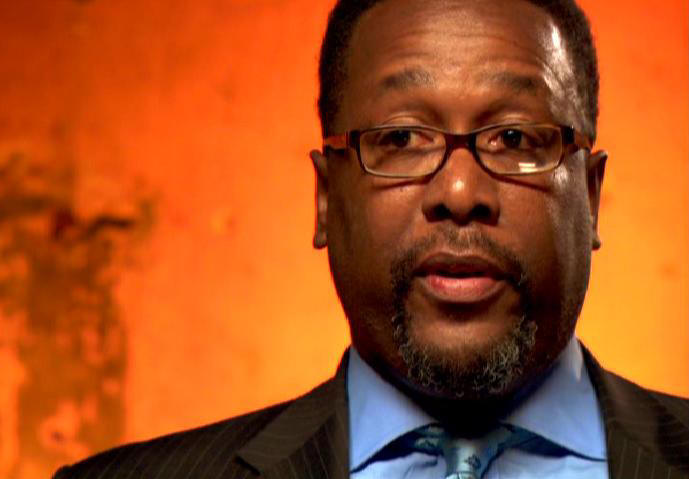 I
believe you were probably living in Baltimore while working on
The Wire
when Katrina hit. As a native of New Orleans, how did
you hear about everything that was going on at home and how did it
affect you and your family?
I
believe you were probably living in Baltimore while working on
The Wire
when Katrina hit. As a native of New Orleans, how did
you hear about everything that was going on at home and how did it
affect you and your family?
Well, I was actually here. I came
in that Saturday for a vacation before I went to Baltimore to shoot
the next season. I evacuated with my parents on that Sunday. We
were in the hurricane still, in a little town called Vacherie,
Louisiana. We were without power and everything, so we just relied
on transistor radios and candles. We heard over the radio that the
levees had broken and people were trapped at the Convention Center.
There is a story that never got out, which is that people actually
tried to get back into the city and do like a Dunkirk run to rescue
the people [referring to a cataclysmic World War II battle in
Dunkirk, France, in which civilians banded together to save trapped
soldiers], and FEMA stopped it. So, I was actually here. My family
lost everything.
What was the experience like
when you first personally experienced the devastation caused by
Katrina to your home and your community?
It was overwhelming. To see the
entire city destroyed, it was like after a nuclear blast. Itís so
overwhelming to try to get people to understand how everything in
your world is affected. Not just your home. Say, God forbid, your
house burns down or someone burglarizes you. Your neighbors are
there to come take care of you. They take you in and make sure you
are okay. But thisÖ everyplace you knew was just destroyed. There
is an episode of The Twilight Zone, where the guy is reading
in a bank vault where they have a nuclear blast and he comes up and
everything is destroyed. Thatís what it was like.
I spoke with Spike in 2006 when
When the
Levees Broke came out and he said that the people
were failed by the government Ė not just Bush, but Nagin and Blanco
and FEMA and everyone else. Five years later, what do you feel has
gotten better and what do you feel has not improved enough?
Well, the one thing, the poetic
truth of this is the fact that in spite of them, the spirit of the
people Ė and the one thing Iíve learned is the resilience of the
human spirit Ė the people themselves have come up with innovative
ways of getting back. Of coming together. Of creating economic
engines for the city and their neighborhoods and all. All the
ingenuity and all of the innovations come from the people
themselves, from the grass roots up. Like the effort that Iím doing
in Pontchartrain Park. We did our own development corporation and
weíre building geothermal and solar homes. The failure is still
happening at the government level. We have constant political
attacks from the governor [Bobby Jindal], who has three billion
dollars of the money and is holding it up and making sure it is not
spent. There has been a war on the poor where they just tear down
all of public housing. Imagine, a city that was destroyed, the only
thing the government has done since Katrina Ė you would think there
would be major government construction programs Ė but no, the only
thing they have done on scale is to tear down. They tore down the
public housing, just to get rid of the poor. Because there are
those who donít have our best interests at heart.
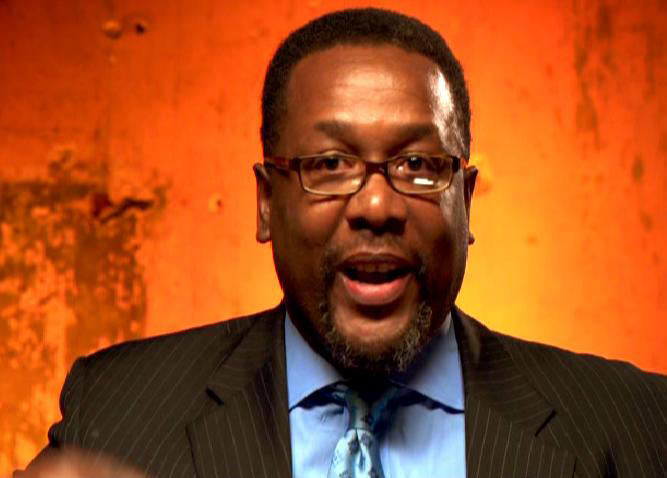 Do
you feel the change in administration has made any difference in the
Federal response? The people interviewed in the film seemed to have
mixed feelings about how much better Obama has been than Bush.
Do
you feel the change in administration has made any difference in the
Federal response? The people interviewed in the film seemed to have
mixed feelings about how much better Obama has been than Bush.
You see what people donít
understand is the federal response is great now. But the still, the
money goes through the state. So if the money goes through the
state, itís not going to be seen in the city. To give you a perfect
example: 750 million dollars is allocated so that we can meet the
new basic flood elevation. But that money canít be used for new
construction. Now, what sense does that make? Money allocated so
people can build homes at the new basic flood elevation, but the
state puts on the prohibition that you canít use it for new
construction. So all people can do is raise their homes Ė that have
been destroyed Ė up to some new basic flood elevation. They even
put the restriction on where you canít use the money for any
renovation. You can only use it to lift the homes. So thereís a
$100,000 grant that you can get to lift a house thatís just a
shell. People are lifting houses that are just a shell and then
saying, ďIíve got to figure out another way to get the money to
renovate.Ē So itís really that Bobby Jindal is the greatest evil
that has set upon us right now. He is closing schools. Heís
closing Charity Hospital. He has torn down public housing. That
battle with the government is still going on. And the unfortunate
thing is: there is a thing called The Stafford Act. No matter how
great the federal response is now, the money goes to the state,
because the Stafford Act says that any federal assistance goes to
the state government Ė you know, because they know better what to
do. So thatís where you get this whole problem. Bobby Jindal is
our problem now. The other thing is, you have this hope and
optimism in the city, with the new government Ė with the Mitch
Landrieu [who became mayor in 2010] administration Ė but we are
looking at this through rose-colored glasses. Nothing has changed.
Yeah, thereís hope. Yeah, he runs city government a little more
efficiently. And of course we have to give him time, to allow
things to change. But, you know, we have to be truthful. To thine
own self be true. Crime is up. School reformationÖ we have school
reform now that you have all these charter schools, but can you just
as a neighborhood kid go to your neighborhood school? No, because
itís not open admissions. They are cherry picking the kids. I tell
people today, the kid who sits across from his school, in his
neighborhood, and you donít pick him to go to his own school Ė he
will pick you to rob in about five years. So, itís all the same
issues, man. The governor is failing us. But itís people who are
still working hard and being innovative.
Spike also said at the time
that it felt like people had already forgotten what happened in New
Orleans Ė and five years later it is just worse. How do you think
it is possible that such a tragedy, which got people so passionate
about helping, could eventually sort of fade away from the public
consciousness?
Two things. The media moves on.
They are looking for the next big story. But, secondly, and most
importantly Ė Martin Luther King said it the best, we are a ten day
nation. He used to tell his staff that all the time. He said, ďWe
have the consciousness of the world and this nation for about ten
days.Ē After that, itís human nature that they will move on and
think of something else. While weíre all looking at the tragedy
right now in Japan, people have even forgotten Haiti.
In
If God Is
Willing, you discuss going to Haiti after the
earthquakes. How did you get involved in that mission and what was
the experience like?
I havenít had a chance to go yet.
There is a good friend and colleague Ė Jamie Hector, who was on
The Wire. He played Marlo and is from Haiti. And I have a
friend who is from Haiti, who is working down there and we sent help
and all. But I personally havenít had a chance to go down yet,
between shooting and still working on this rebuilding of New
Orleans.
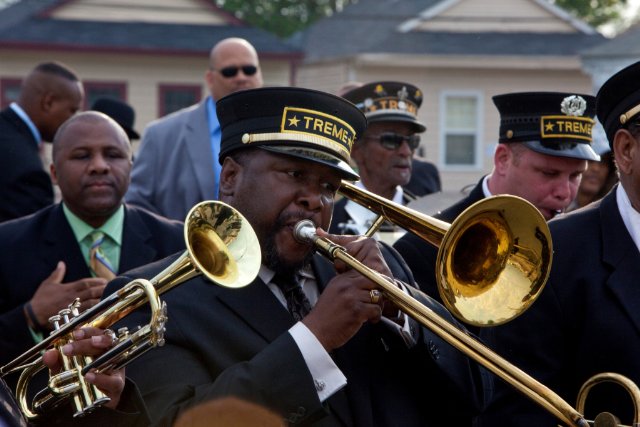 Of
course New Orleans also got hit with the man-made tragedy of the BP
oil spill last year. How devastating was that for the city which
was trying to bring itself back?
Of
course New Orleans also got hit with the man-made tragedy of the BP
oil spill last year. How devastating was that for the city which
was trying to bring itself back?
I think thatís on a larger scale
affected the whole area. Itís affected the seafood industry.
Tourism is still going well here in the city. Itís affected our
restaurants in the city. In the hinterlands, just outside the city,
itís really hit them even harder, because so much of their industry
is based on oil and seafood and fishing Ė commercial and
recreational fishing. Itís hit those communities harder. I am in
the minority here, because I am for a moratorium on the drilling.
Iím a part of the green technology economy. Thatís what I believe.
I am actually part of a group that has started the Louisiana
Sustainability Fund. Itís a 250 million dollar private equity fund
that is focused on clean tech companies in energy. Energy storage
companies and water purification companies. You can do good and be
profitable at the same time. Thatís what weíre doing with the
Louisiana Sustainability Fund. But so many people are so desperate
to get the drilling started again, or to make sure that we keep
drilling in the Gulf, because so much of the economy is based on
that in Louisiana. What Iím saying is, keep that sort of
infrastructure, just flip it to industries and technologies that are
not going to destroy the ecosystem and destroy the very thing that
we canít replace Ė which is the Gulf, which is the ecosystem of the
Gulf, the seafood of the Gulf. We have dolphins washing up dead
now. You think all of that oil just went away? Even if you broke
it up so microbes can eat it, at a certain point you canít justÖ if
you eat a couple of bowls of pasta, eventually youíre going to be
full. You canít just keep eating and eating. So the risk/reward
isnít worth it. I would think that on the year anniversary of this
happening that people would understand that and be focusing more on
green technology. Thatís why weíre putting our money where our
mouth is, where a group of men and women who has Louisiana
connections started this Louisiana Sustainability Fund. Itís going
to bring the jobs that we need.
At the end, you described
yourself as an actor and the President of the
Pontchartrain Park Community Development
Corporation. Do you feel that your fame can help you spread
the word on your more altruistic pursuits?
Yeah. First of all, that was the
thing that kind of got the word out there. CNN wouldnít have done a
documentary on Pontchartrain Park and our efforts if it hadnít been
for my involvement. I knew that. Recognition and celebrity is a
tangible thing. I never really explored whatever little celebrity I
had. I thought if I canít use that now, for such a great effort,
then when can I use it? What happened is, itís affecting hundreds
and hundreds of people. Then it sets up a template that can be used
and become infectious as people understand what we are doing. Iím
testifying and giving keynote speeches all over because of the work
that Iím doing. I was on Meet the Press and CNN did the
documentary because of the recognition. But itís not for me; itís
actually a celebration of what the people are doing. Iím not doing
this alone. Itís how weíve come together. I just give a voice to
the voices. Give a platform to so many people who donít have that
platform. So, Iím appreciative of celebrity because of that.
You also were in the part about
the Saints winning the Super Bowl. How do you feel that the success
of a sports team can bring a city together?
Well, itís an emotional, cathartic
moment. It was like one of the greatest cathartic moments. It was
the shedding of the a forty year burden. That has a major impact.
But itís short-lived. Itís like having a great big party. Itís
short-lived when it comes to end of emotion. As a businessman, I
appreciate the economic impact of having a championship sports
team. That was the thing that the Saints never got over those forty
years. To actually win is not just a championship, it has a major
economic impact, because people buy your merchandise all over the
world and you are recognized and people come because of that. Itís
reflected also in Treme, what weíre doing, because on Sunday
nights, people come around the city and have this cathartic moment
of watching Treme and seeing how that happens. I think itís
the same thing that happened with God Willing. People got
together and everyone stopped for a moment to say ďletís relive
whatís happening and understand that this is something that is
meaningful and happening in our lives now.Ē So the impact of a
sports team can be important. Emotionally, and financially, when it
comes to the economic impact. But that canít be all of it. There
is still a lot of work to be done and we canít just pretend that
everything went away because we won the Super Bowl.
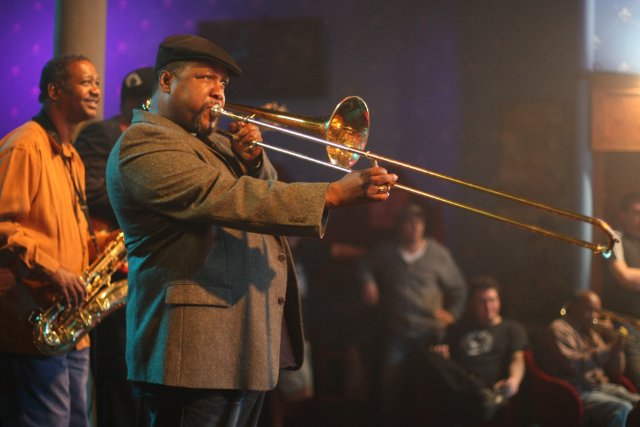 You
are now working in New Orleans again for the HBO series
Treme.
What is it like to get the opportunity to act in your hometown?
You
are now working in New Orleans again for the HBO series
Treme.
What is it like to get the opportunity to act in your hometown?
Itís more than a job Ė this will
be a marked time in my life. Years from now, kids will be able to
say to me, ďMr. Pierce, in New Orleansí darkest hours, after the
disaster, what did you do?Ē I can take them to a home in
Pontchartain Park. We can sit down and watch this work that I did
as an actor trying to talk about the lives of people in New
Orleans. Itís art imitating life and life imitating art, so itís a
very special thing.
As an actor, it would probably
be better for your career to live in New York or Los Angeles. What
is it about New Orleans that keeps you there?
Well, I actually do live in New
York and Los Angeles. I consider myself tri-coastal. I was in LA a
couple of weeks ago and Iím going to be in New York next week. I go
back and forth between the cities. But there is always home. New
Orleans is home. Iím here now more and working out of here more
because itís a call to action, man. All hands on deck. The city
needs the help. Once she gets her footing, then Iíll go back to
being bi-coastal.
Well, speaking of
Treme, the second season is going to be starting soon. What can we expect
in the new season?
Itís a year later. I distinctly
remember what that moment meant for us here in New Orleans Ė
realizing that weíre in this for the long haul. The realization
after all the media went away and all the attention was starting to
go away and youíre left with devastation and your life in the state
that itís in. You realize, wow, itís going to take every fiber of
my body to get back up. Thatís when the realization is sinking in.
Thatís what the season is like this year Ė the realization that your
life has been changed and youíve got a lot of work to do to get it
back.
Will the oil spill be
dramatized in future episodes?
Well, weíre doing it
chronologically. This is 2006, going into 2007. So there is a
four-year lag on the show. Itís interesting, because looking back,
it gives people a little perspective. Youíre looking back at a time
that is always four years behind you. It helps people to realize
how far theyíve come and also how far we still have to go. That
also happens with God Willing. In God Willing, itís
that realization. You sit down and you say ďokay.Ē But as you look
at God Willing and all of this, the most important thing is
to learn the lesson of what the people are saying. The resilience
of the human spirit. Itís not just some disaster story. The
documentation is not of the tragedy, but the perseverance of human
spirit. Example after example after example after example of the
characters of the people that you meet in God Willing.
Celebrating in that moment where weíre second lining at the end, you
are looking at a collection of people who are expressing and
demonstrating the resilience of the human spirit that has not been
seen in a generation.
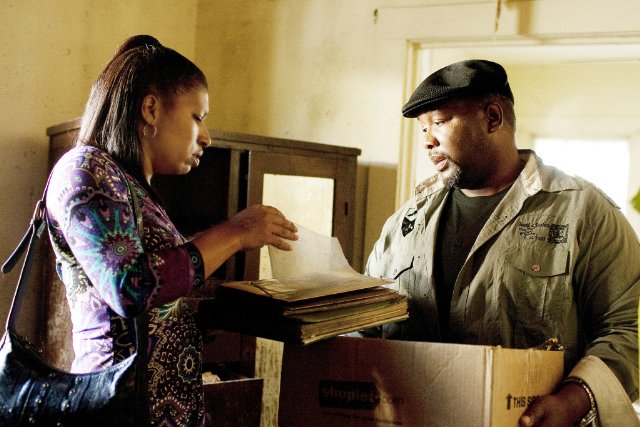 Phyllis
Montana-LeBlanc from the documentaries ended up playing your
girlfriend on
Treme.
Phyllis
Montana-LeBlanc from the documentaries ended up playing your
girlfriend on
Treme.
Yes.
Obviously, she hadnít been a
professional actress before, what was she like to work with?
Sheís great. Phyllis is great.
Sheís an actor now. Sheís definitely an actor now. I love working
with her and she is a talent. Sheís a talent already. Thatís what
is recognized from the first [film, When the Levees Broke]Ö
from all of the documentaries. We just took that talent and brought
that authenticity of who she is to Treme and then she just
learned and expanded as an actress. Itís wonderful working with
her. I love working with her. She is a wonderful woman.
Treme
is your second series with David Simon (who also created
The Wire). What is it about working with him
that you enjoy?
David has spoiled me, really,
because the work that he does finds the extraordinary in the
ordinary. Itís almost cinema verite. It is an ease and a
focus on authenticity that connects the actors to the material in a
deeper way. It also is not any sort of formula that you will ever
see on television. He breaks the convention of formulaic
television. Itís really a study of human natureÖ a study of human
nature in particularly interesting situations and extraordinary
places and extraordinary times. But the ordinary in those times.
That can be celebrated and a source of inspiration and a source of
knowledge and learning. Thatís the thing I really appreciate. He
celebrates the human nature, just the small acts of human nature of
how people live their lives every day. I appreciate that, because I
know that eventually things will come to an end and Iím going to
have to go back to material that will be very difficult to do,
because itís going to be so much less rich. His worlds are so
rich.
The Wire
could arguably be said to be on the short list of the best
television dramas ever.
Yes.
What was the experience like
and how cool was it to be on such an artistically stimulating
series?
What was so great was that itís
about the work that you do and the people that you meet. What an
extraordinary cast. An extraordinary crew. What extraordinary
writers. Knowing that out of the shine of New York and LA, outside
of the loop of professional television and Hollywood, in little
houses and bars and stations and warehouses in Baltimore Ė like New
Orleans, populated with these little homes and street scenes and
places around Ė that you create something that is lasting. Thatís
all youíve always wanted as an artist. I feel like Iíve been
blessed to no end. I know that these are defining moments of my
career.
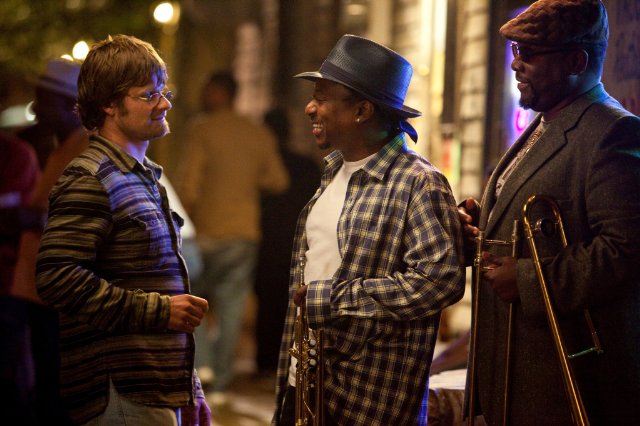 I
have to admit, the first time I remember seeing you was in the short
lived sitcom
The Weber Show.
I
have to admit, the first time I remember seeing you was in the short
lived sitcom
The Weber Show.
(laughs)
Oh, yes.
Most of what you have done
since then has been very serious. Would you like to do more comedy
again?
Well, I find the comedy in these
shows. There was a run of sitcoms that I did there for a while,
that I told my agents, ďNo, Iím getting in a rut. People are seeing
me just one way. I need to do something else.Ē Thatís when I
actually went out on an audition for a little show called The
Wire. Thatís when I realized that I am enjoying being in shows
that are about a little more in-depth look at life. There will be
enough comedy to come. These opportunities are the rare ones, so
Iím going to ride this horse as long as I can.
New Orleans is a city with such a vital musical tradition.
You play a musician in
Treme
and you also host the radio series ďJazz at Lincoln
Center.Ē Had things happened differently in your life, would you
have liked to have made a living as a musician?
Let me tell you, that is a dream
of mine. I hung out with musicians growing up. We went to the New
Orleans Center for Creative Arts, a performing arts high school
here. I knew Wynton and Branford Marsalis and Donald Harrison and
Terence Blanchard and Harry Connick, Jr. and all of those cats,
man. And their mentor, Ellis Marsalis. I just grew up around so
much music and musicians that thatís a secret love of mine. But
whatís so great about being an actor is I had a lot of interest in a
whole bunch of different things, and thatís the thing that allows
you to explore. As an actor you get to do all of these different
things and get to be all of these different people that you may have
been if you had taken another path.
Several people in If God is
Willing and Da Creek Donít Rise suggested that New Orleans has
through history been sort of cursed with bad luck. What are your
feelings on that subject?
I think there is no bad luck.
What happens is there is a thin veil between prosperity and
destruction. There is a thin veil between people acting with great
good will and people acting in the most heinous and evil ways. What
we see, we forget about that negative side. Forget about that
tragedy. We forget and we assume that sometimes what happened to
usÖ the rarity is a city that isnít devastated at some point in its
history. But that we donít see the ugly side of human nature. We
donít see the failures of government at all. Those are a given.
That will come, no matter where you live, Jay.
Iím in Philadelphia.
Well, did you ever go to West
Philly back in the day?
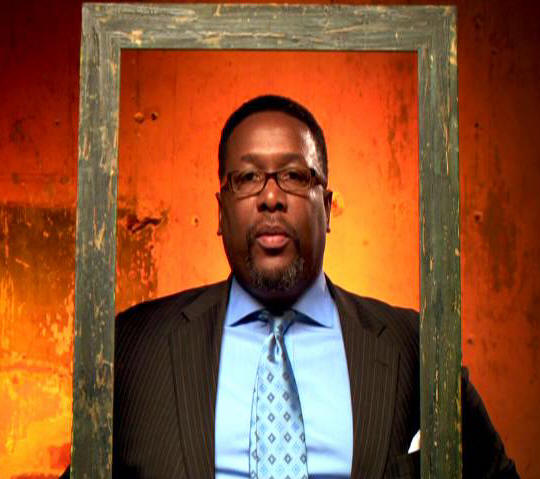 Oh, yeah, absolutely. Also, my
motherís family is from New Orleans. In fact, my great uncle was a
fairly well known artist in the 30s and 40s who mostly sketched
areas of New Orleans. His name was J. Carl Hancock.
Oh, yeah, absolutely. Also, my
motherís family is from New Orleans. In fact, my great uncle was a
fairly well known artist in the 30s and 40s who mostly sketched
areas of New Orleans. His name was J. Carl Hancock.
Okay, yeah. He was a contemporary
of a guy named Paul Ninas, who is a favorite of mine. So, what
happens is, man, it just shows you that New Orleans was of great
importance for a very long time. That there was the Battle of New
Orleans; that thereís been floods and destruction. The fact is, and
bad choices made because of the ignorance of human nature. The
attacks on the poor and the racial animosity that slavery can bring
about, thatís a legacy thatís passed on. That people are going to
have to deal with. You walk around the street where all of the
sudden you see a white guy with the same name as you and you go hey,
just up the river about 20 minutes from here, your people owned me.
You look at the legacy of it just here in the geography. Our
greatest, grandest avenue is St. Charles Avenue. Right behind it is
one of the poorest sections of the city Ė literally two blocks
behind it. One of the poorest sections of the city. A lot of
crime. Itís the residual of that. These were the huge plantation
owners homes on the grand avenue, and behind them is where they kept
their enslaved people. These are the descendants of them, just one
generation ago. My motherís grandfather was a slave. My mother is
still alive. She can say, ďI remember my grandfather.Ē Thatís just
one degree of separation from me. So, itís not cursed by anything.
We reap what we sow. Itís how you respond to the tragedy that will
define you most in your life. Thatís for the individual and a
city.
Spike actually did the nearly
impossible in the series in making even Brownie (former FEMA chief
Michael Brown) seem to be almost a sympathetic character.
(laughs) I know.
Watching the documentaries
back, what surprised you the most to learn?
Like I said before, you look at
that and you realize that there are those who donít have your best
interests at heart. There are those who have a different agenda
than actually helping the city. What you have to focus on is those
who have the greatest of human nature, who help and want to change
the situation and share your agenda of moving forward. Of being
proactive. Of bringing something of a higher quality back. Of
trying to do things to be preventative of something happening
again. You seek that out in the human spirit that people display.
Thatís the key. Donít get lost in the one track of the one
individual and how they play the agenda. The thing that you learned
from that is that it all goes back to Bush when it comes to
Brownie. The lesson we can learn from his situation is donít just
carry the water. You carry the water, [then] tell the truth.